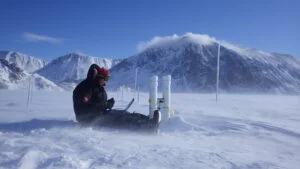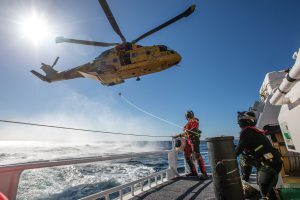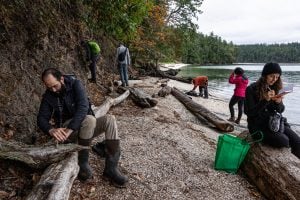
Environment
The sixth extinction
The planet is in the midst of drastic biodiversity loss that some experts think may be the next great species die-off. How did we get here and what can be done about it?
- 4895 words
- 20 minutes
This article is over 5 years old and may contain outdated information.
Kids

It was a day of battles, gunfire, food and fun as the Grade 8 students from École Antoine-Roy enjoyed their first full day in British Columbia on Canada’s Coolest School Trip.
The sun came too early for some, but the students were up and exploring by 7 a.m. They chowed down on a traditional military breakfast prepared by Don Thomas from the Victoria Esquimalt Military Reenactment Association. Thomas barked greetings and served up baked beans, potatoes and boiled sausage, which were surprisingly tasty and more than enough to fill everyone up for the morning.
After washing dishes in three old washtubs, the class gathered for their first activity — a battle, with the enemy being invasive species plants. After a quick lesson from Parks Canada’s Species at Risk team in what to cut and how, the class, armed with gloves and clippers, were divided up and sent to war. The prize for the group that collected the most invasive plants was first dibs at lunch.
After the battle, Genevieve Goggin from Parks Canada and Canadian Geographic‘s photo editor Jessica Burtnick gave the students a quick lesson in photo composition and sent the class around Fort Rodd Hill National Historic Site to practice their new photography skills.
A short walk to the beach below the fort’s battlements took the class to their lunch spot, with a traditional West Coast feast of fire-baked sockeye and spring salmon prepared by First Nations Parks Canada employees. Elder Edward Dick led two Parks Canada employees in a traditional song before serving the delicious meal.
After a short rest to digest, the students were treated to a ride around the fort in a 1942 jeep. They then played a geo-location game using Explora, a new Parks Canada app which points users to key areas and asks questions about the location on arrival.
Up next was a gun show. No biceps were flexed, but there was a historical weapons demonstration by Parks Canada of an Enfield revolver, a Mark IV Lee-Enfield rifle and a Bren gun. Had it been 1939, these 14-year-old students would have been only a few years away from heading to Europe’s battlefields and a life defined by the crack of the Lee-Enfield and ripping bark of the Bren.
The class was treated to a barbecue dinner and, after packing up for an early morning departure, gathered around a camp fire for s’mores. Bellies full, the class headed to the Fisgard Lighthouse National Historic Site, one of the oldest working lighthouses in Canada.
Tomorrow, the Coolest School Trip continues with whale watching and a stay on Sidney Island in the Gulf Islands National Park Reserve.
Want to find out more about the trip? Read yesterday’s blog on the beginning of the adventure and go to the Canada’s Coolest School Trip website.
Are you passionate about Canadian geography?
You can support Canadian Geographic in 3 ways:

Environment
The planet is in the midst of drastic biodiversity loss that some experts think may be the next great species die-off. How did we get here and what can be done about it?

Science & Tech
Celebrating Canadian Innovation Week 2023 by spotlighting the people and organizations designing a better future

People & Culture
A celebration of the Canadian Coast Guard’s renowned search-and-rescue capabilities — and more — as the special operating agency turns 60

People & Culture
Naming leads to knowing, which leads to understanding. Residents of a small British Columbia island take to the forests and beaches to connect with their nonhuman neighbours